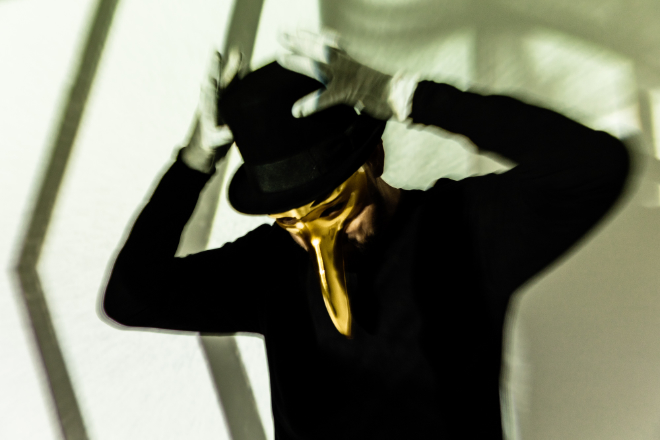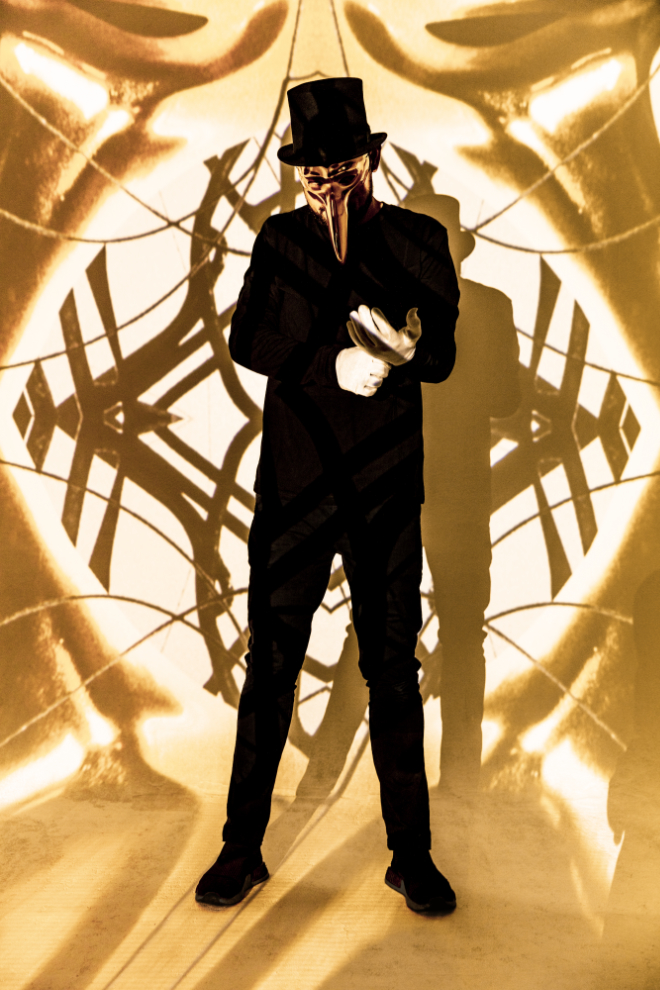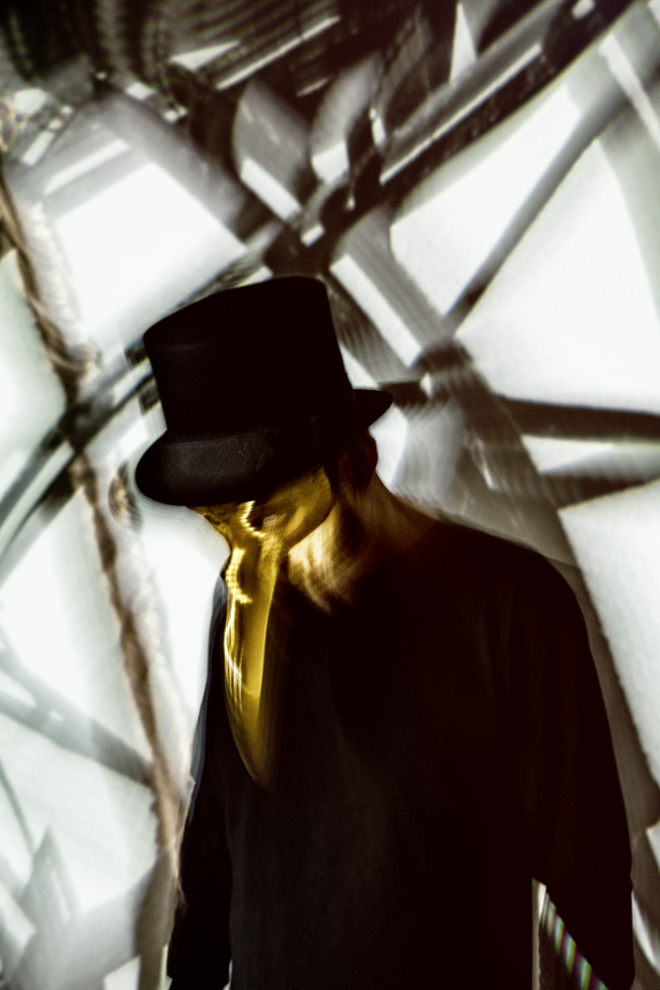Video Feature & Web-Exclusive Interview
DJ: CLAPTONE
Video: “Just a Ghost” featuring Seal on vocals
C L A P T O N E
Sonic Being Golden-Beaked Birdman Spreads Wings and
Soars To New Heights With Third Studio Effort “Closer”
Lights and shadows mingle together offering the clubbers a glimpse of their shaman in his natural habitat. Attired in black, with top hat and golden-beaked mask, this mystery man is one with his audience. From behind a mixing console, he beckons with white gloved hands which move in synchronicity to bass lines that curl up and reverberate inside the faithful’s rib cages. The phantom, known only by a pseudonym Claptone, is the Pied Piper of electronic, house and dance music who can lead his followers anywhere he wants at this Masquerade live event. The world-famous DJ and music producer performs this ritual for thousands, 300 times a year in New York, LA, Paris and London, and at festivals like Coachella and Rock in Rio, to name a few.
Since 2015’s debut release Charmer, Claptone’s imagery has been built around a mystique, and his true identity is unknown. Maintaining a status of anonymity, in the internet age of Google and social media platforms, is an accomplishment worthy of as much merit as reaching 100 million combined YouTube views of his live stream sets. With over a million Facebook followers, sometimes it is easy to forget there is flesh and bone behind the elusive aura, and my reminder comes in the form of a phone call from Germany. I ask, “Is this Claptone?” “Yes,” responds the nondescript voice. Although he is not willing to provide any clues to his real identity, he is gracious and obliging. During our conversation, before he flies out to the U.S., I attempt to peel back the Venetian disguise.
It’s all about the vibe that the DJ creates with the help of music as the form of communication—bringing people together—creating an environment of love.
Reflecting on when the artist first became interested in making music, Claptone refers to himself as always being a “sonic being.” He traces his music origins to being rooted in enjoying all kinds of sounds in nature that accompany you when you walk through life—the birds, the bees, the wind. At a certain point, it all sounded like music and inspired him to make music of his own.
The mysterious persona with top hat, gloves and golden-beaked mask, a haunting reference to protective clothing worn by doctors during the Bubonic Plague was not chosen by Claptone. In the beginning, the performer’s image was not explored consciously but rather grew with the music and evolved. The mystery associated with Claptone is a metaphor. Everyone wears a mask, when confronting questions about what kind of person he or she is and what his or her soul looks like. He makes the point with this quip, “I’m a mystery, as everybody else is. If people want to look behind the mask, they’re welcome to try.”
House, dance and electronic are music genres synonymous with a DJ. Claptone deconstructs the essential function of DJs. Offering his philosophy, “The DJ is there to bring positivity and joy to the people—and make them dance and have a good time. It’s all about the vibe that the DJ creates with the help of music as the form of communication—bringing people together and having a great time so it’s not functional at all. It’s basically creating an environment of love.”
Viewing locations, audiences and the global village through a unique lens, Claptone is against the notion of nation. “I don’t like to tell you that the Australians party better than the Germans, or the Brazilians are the best, and the Mexicans are amazing—that’s not how I think. I try to enjoy every night with the people that are there and usually the people who come to my shows are a great and joyful lovely crowd. I try to give them the love back and try to make everyone have a great time, no matter what they are and no matter who they love, and no matter where they’re born, no matter what they think. I try not to discriminate. Create a space and sound where it’s not about discrimination or where you’re from—and if you’re this nation or that nation. It doesn’t matter to me.”
I’m a mystery, as everybody else is. If people want to look behind the mask, they’re welcome to try.
Singles “Cream,” “No Eyes” and “Heartbeat” brought Claptone chart success. Co-produced by Grammy winner Stuart Price, Claptone’s third studio effort Closer boasts an eclectic talent roster and collaborations. The track “Nobody” features Barry Manilow, while Seal makes an appearance on “Just a Ghost.” Offering a behind the scenes glimpse of the project, Claptone shares what is it about Manilow and Seal that he admires artistically, and motivated him to include them on Closer. “As you know, I’m very old and have been around forever so I admire legends and people that have also been around forever. Barry Manilow, as far as I can think back, he was there and he’s an icon in American music. Almost the same goes for Seal. What I love about Seal is he started out electronically and then went away from the electronic music. I really wanted to bring him back to the electronic music. With Barry, it was more like I was inspired by all his work and he wanted to sound fresh again and do something that is unexpected—and that thrilled me. It was great to bring this to life with him.”
Achieving success both in the recording studio and as a live performer without any education in the classical sense, Claptone seems reluctant to give advice to aspiring professional musicians. With an unwavering sincerity, he opens up—revealing the less glamorous aspects of the music industry and what it takes to succeed. “If there’s one advice I always give: follow your heart. If you’re passionate about something, whatever it may be—music or building houses—if you’re passionate about that and want to make that your life, do it because the best thing that can happen to you is to be passionate about your job. Make your job, your life and your passion—all one. That’s what happened to me. I don’t really think I would be right in telling young people you have to do music because that’s where the money is and that’s where the girls are. That’s wrong, in my opinion. I feel music is just one field that looks amazing to the outside, especially through social media and everything. It’s probably part of pop music to have the images and we look flashy and great. That’s what makes it attractive. But when you have to fly from one show to the other every day—like 4, 5, 10-hour flights, it’s a tough job. You’ve got to love it. You’ve got to love making music. You’ve got to love traveling to all the DJ gigs. If you’re in it for the money, the girls, the drugs or whatever terrible things—then you won’t make it. It is for love, for the dedicated and the passionate.”
Claptone is the Pied Piper of electronic, house and dance music who can lead his followers anywhere he wants.
With credits that include Sir Elton John and Dua Lipa’s “Cold Heart,” Claptone is a master of remixing with a unique methodology. Before committing to a remix, the song needs to touch him, with potential for perspective to be translated to his audience. He elaborates, “First of all, I get an offer and then I need to love the song already. I need to have a perspective. Most of the time, I’m listening to the song and thinking ‘Oh, this is amazing; I want to bring this to my crowd. I want to bring this to the people where I DJ—to people who probably wouldn’t listen to that song. But I can remix it in a way and translate it to the dance floor, where I have my Masquerade parties, or where I have a big festival or a club where I know if I remix it a certain way, I can sell it to the crowd—and they will love it. Whereas, before I remixed it, it’s just a great song and most of my fans wouldn’t understand it. So that’s mainly how I choose the remix—if I can see a perspective for me to translate it to my audience.”
I’m basically against the notion of nation.
The golden birdman is poised to spread his wings and soar to even greater heights with another Claptone remix coming out soon, and more singles from the song-oriented new album Closer. He just remixed Oden & Fatzo’s “Lauren” which he describes as a great classic house kind of disco in France. He has also been offered some other very interesting remixes. For the uninitiated, he suggests “make it a point to check out the Closer album, it’s worth it.”
Balancing his Clapcast podcast, work in a recording studio and live shows—offer challenges and rewards, “When you’re always touring and playing every day to a crowd, it’s great to also have my Clapcast where I can play brand new music and also a little bit of a left field here and there, and introduce new music. Also, of course I love to be in the studio. So when I’m not traveling, it’s a reward for me to be in the studio and make music—then I’m looking forward to being on tour again. I guess you need all of this because that’s what makes it a great job.”
An ultimate mix tape would have Claptone’s name scribbled on it. Asking the audio architect what three songs would be included on such a collection, he provides a practical approach, “They always vary. There’s so much music. It depends who I make the mix tape for. For my parents, it would be different than for my friends or for my audience, or for you. It’s the same with DJs. I would look at who the mix tape is for and adjust my personal style accordingly.”
I’ve always been a sonic being.
Our conversation now mere words evaporating into the ether, and I’m left with the same feeling as someone who attends a costume ball. There is a sense of familiarity with all the guests in attendance but bubbling underneath the surface, new mysteries and questions emerge.
— Rodeo Marie Hanson
www.Claptone.com
www.Instagram.com/claptone.official
www.Twitter.com/Claptone_
www.Facebook.com/claptone.official
www.YouTube.com/Claptone_Official







comment closed